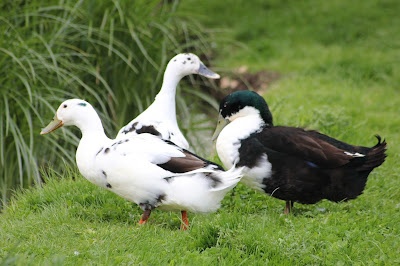We've had a lot of chickens turn broody this year and we have had three broods of chicks hatch out. My hope that one of our Cayuga / Cherry Valley crosses might be sitting on a clutch of eggs have been undone, for after a few days sitting, she is back on the Flyte so Fancy pond.
I am a big fan of ducks and like chickens they make wonderful pets and companions in the garden. Like keeping chickens there are advantages and disadvantages to keeping ducks.
ADVANTAGES
- Ducks have great characters and are very amusing to watch. Especially a flock of Indian Runner Duck gliding around the garden.
- Most breeds of ducks only require a small amount of water to be happy. NO large ponds required.
- Some ducks are prolific layers, laying right through the winter months also.
- Due to thicker feathers and their oiled covering, ducks do not suffer red mite.
- Ducks will clear a garden of slugs and bugs, great for vegetable patches.
- Less fussy than a chicken, a duck will lay an egg anywhere.
DISADVANTAGES
- Ducks are messy. If contained continually within a specific area they will, in time, turn it to mud.
- Ducks require plenty of fresh water for cleaning and staying healthy. Water needs changing regularly to avoid disease.
- Some breeds of ducks can be very vocal, i.e Call Ducks
- They will lay eggs anywhere.
For more information have a look at our Basic Guide to Keeping Ducks Information Page.
The largest misconception people have about keeping ducks is the belief you need a large pond or lake for them to live on. This is far from true. A lot of breed of ducks will be happy with something the size of a large washing up bowl, in which to paddle. It is vitally important to provide separate water for drinking and for cleaning. Ducks need a water bowl for cleaning themselves, that is wide enough for the duck to sit in and submerge its head. This dunking of the head is vital for ducks for cleaning their feathers and washing their eyes.
 |
| The FSF Ducks |
If you have any questions about Flyte so Fancy Duck Houses leave a comment below or call us on 01300 345229 to talk to a member of the FSF team.
Thanks for Reading
James




